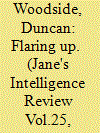| Srl | Item |
| 1 |
ID:
125590


|
|
|
|
|
| Publication |
2013.
|
| Summary/Abstract |
A leadership crisis has emerged in South Sudan amid low economic development, high level of corruption, and weak state institutions, Duncan Woodside assesses the prospects for political resolution and the risk of intervention by the military.
|
|
|
|
|
|
|
|
|
|
|
|
|
|
|
|
| 2 |
ID:
086735


|
|
|
|
|
| Publication |
2009.
|
| Summary/Abstract |
Events that take place in the springtime, particularly in April, have generally shaped contemporary Nepali politics. If the People's Movement in 2006 ensured that King Gyanendra had to give way and the people reigned supreme, in April 2008 elections to the Constituent Assembly threw up an unexpected result, leaving the Maoists with the single largest vote share. This spring, Nepal faces a multitude of challenges, from pushing ahead with the writing of the constitution and the peace process in general, to ensuring a semblance of governance and strengthening of democratic institutions
|
|
|
|
|
|
|
|
|
|
|
|
|
|
|
|
| 3 |
ID:
116467


|
|
|
|
|
| Publication |
2012.
|
| Summary/Abstract |
We explicate the precise role that one specific emotion, disgust, plays in generating political acrimony. We do this by identifying the link between the different dimensions along which moral judgments are made by those espousing different political ideologies and the different emotions which undergird these evaluations. These assessments reliably track along liberal and conservative dimensions and are linked to the way values associated with purity and sanctity elicit greater degrees of disgust among conservatives. Here, we review a growing literature showing how disgust affects the psychology of politics through its influence on the cognitive and emotional processes that govern judgments of morality, as well as its direct impact on specific policy preferences. We then apply these findings to the nature and tenor of political discourse and suggest some ways that disgust might affect the character and function of democratic debate and tolerance. Finally, we discuss what these findings mean for public policy.
|
|
|
|
|
|
|
|
|
|
|
|
|
|
|
|